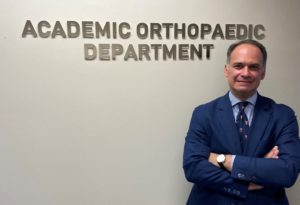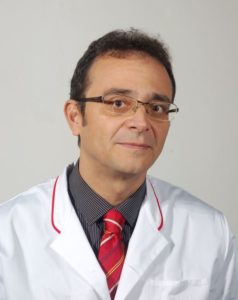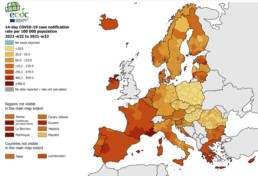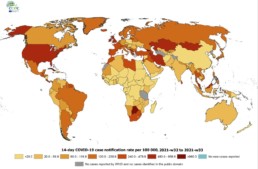EHS Secretary General, Professor Eleftherios Tsiridis

Hopefully all our members got to enjoy some rest and relaxation during August, even if it was within their own country rather than abroad. Covid-19 unfortunately remains rife, especially after many tourist destinations became overfull following the freedoms of summertime, but thankfully we see far fewer severe cases due to the vaccine wall. However, many orthopaedic wards are still running at a very limited capacity due to Covid-19 patients, and trainee surgeons are suffering by seeing very little in the OR.
This month top delegates from across the World Health Organisation European Region will gather online for the 71st session of the WHO Regional Committee for Europe to discuss the onward going plan of action, which will probably involve a 3rd dose for some parts of society, including of course surgeons. So far, among adults in EU/EEA, the cumulative uptake of at least one dose is 76% and cumulative uptake of full vaccination 67.3%.
The maps below on the current state of the pandemic are from the European Centre for Disease Prevention and Control (an EU agency). Our Diary of an Orthopaedic Surgeon this month is from Timisoara in Romania: thank you very much to our Nat Rep there, Assoc Prof Bogdan Deleanu. This is my last Covid-19 Update Page for the EHS Newsletter, as my term as Secretary General is finishing next week in Lille. However our EHS Membership Secretary (samstokesehs@gmail.com) will of course continue with reports on the COVID-19 developments with our new Secretary General. Thank you.
The impact of COVID-19 on the delivery of Orthopaedic Surgery: a view from Romania, by Assoc Prof Bogdan Deleanu

Dear Colleagues!
It is a pleasure and a privilege to be this month’s Ambassador of the European Hip Society.
The COVID-19 pandemic had an unprecedented impact on the modern world. From the beginning of 2020, everyone was forced to quickly adapt to previously unheard of restrictions and limitations with the hope of limiting the spread of the disease. An emotionally intense lockdown, use of personal protective equipment and physical distancing became the new normal. As the disease continued to evolve, the high number of cases burdened the healthcare systems.
Romania is a middle income country, with over 19 million inhabitants, located at the eastern border of the European Union. At the end of February 2020 we had the first confirmed case of COVID-19. In order to stop the virus from spreading, a state of emergency was declared on March 16-th. The first wave of the disease was well managed and the lockdown ended on 14 May.
One of the most seriously hit specialty was orthopaedics, due to the large number of postponable elective procedures with high resource requirements. Joint replacements were stopped and many orthopaedic departments were converted to COVID-19 facilities. The main orthopaedics and trauma providers in our country are state run and owned regional hospitals. The private sector is developing and includes small to middle sized facilities.
Efforts to safely resume elective procedures were made throughout the following months. Patients exhibited a tendency to avoid health care facilities that were busy COVID-19 support centres. In addition, they were willing to postpone treatments which required hospitalization. In the fall of 2020 we experienced the second wave. The return to the (new) normal was faster in the private clinics, likely due to the smaller scale and lack of COVID-19 support conversions.
The orthopaedic scientific community adapted. Conferences, annual meetings, courses and workshops were cancelled, postponed, or held online. Education suffered greatly from social distancing. The switch to online sessions and reduced patient volume deprived students and residents of bed side experiences and direct teacher–student transfer of clinical skills.
Vaccination against COVID-19 started at the end of December 2020 and the hopes are high. As of 23-th of August 2021 over 1 million inhabitants were confirmed positive of which approximately 3% died. 5 million received full immunization, most with the Pfizer product. Nevertheless, the war is not over yet.
I would like to thank Professor Eleftherios Tsiridis and the European Hip Society for their resilience, support and sustained efforts to keep the standards high in these difficult times.
Looking forward to a brighter future.
Yours sincerely,



